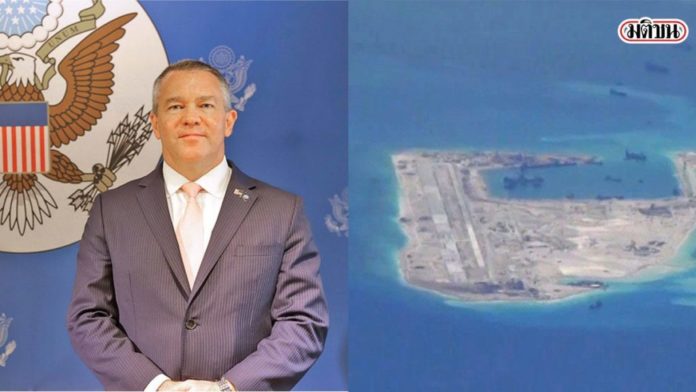| เผยแพร่ |
|---|
ทูตสหรัฐ เขียนบทความ อัดจีน ไม่รักษาสัญญาในทะเลจีนใต้ ชี้ไทยก็ไม่รอดโดนผลกระทบด้วย
เมื่อวันที่ 14 ก.ค. สถานเอกอัคราชทูตสหรัฐอเมริกาประจำประเทศไทย เผยแพร่บทความของไมเคิล จอร์จ ดีซอมบรี เอกอัครราชทูตสหรัฐอเมริกาประจำประเทศไทย เรื่อง การธำรงไว้ซึ่งสิทธิอธิปไตยของรัฐทั้งมวล ระบุว่า
ขณะโลกกำลังมุ่งเน้นความสนใจไปที่การต่อสู้กับโรคโควิด-19 สาธารณรัฐประชาชนจีนกลับฉวยโอกาสเมื่อชาติอื่นๆ ไม่ทันระวัง ยกระดับการกระทำรุกรานในทะเลจีนใต้ ยุทธวิธีการบีบบังคับ บ่อนทำลาย และให้ข้อมูลบิดเบือนในทะเลจีนใต้ ทำให้เกิดคำถามว่า สาธารณรัฐประชาชนจีนอาจใช้วิธีการดังกล่าวในส่วนอื่นๆ ของภูมิภาคอินโด-แปซิฟิกอย่างไรบ้าง
เมื่อวันที่ 1 เมษายน ทางการจีนประกาศดำเนินโครงการใหม่ที่มีชื่อว่า “Blue Sea 2020” ว่าด้วยการบังคับใช้กฎหมายทางทะเล โดยระบุว่ามีวัตถุประสงค์เพื่อ “ยกระดับการคุ้มครองสิ่งแวดล้อมทางทะเล” แต่เหตุการณ์ในวันต่อมาได้สะท้อนถึงเป้าหมายที่แท้จริงเมื่อเรือของจีนจมเรือประมงเวียดนาม ทางการจีนได้เสริมกำลังของฐานทัพหลายแห่งรอบหมู่เกาะสแปรตลี (Spratly Islands) ซึ่งเป็นพื้นที่พิพาท ด้วยการส่งเครื่องบินเข้าไปประจำการเพิ่ม และจัดตั้ง “สถานีวิจัย” หลายแห่ง ตลอดจนส่งเรือสำรวจแหล่งพลังงานและกองเรือรบติดอาวุธลงพื้นที่เพื่อข่มขวัญผู้ประกอบการน้ำมันและก๊าซนอกชายฝั่งมาเลเซีย และยั่วยุอินโดนีเซียโดยการส่งเรือประมงและเรือคุ้มกันจำนวนหลายร้อยลำเข้าไปยังน่านน้ำรอบเกาะนาทูนา (Natuna Island) ของอินโดนีเซีย ทางการจีนเตือนว่าผู้ใดก็ตามที่ต่อต้านคำกล่าวอ้างอธิปไตยอันน่าขันของจีนเหนือทะเลจีนใต้นั้น “จะต้องประสบกับความล้มเหลว”
การกระทำเหล่านี้เข้ากับแบบแผนอย่างหนึ่ง นั่นคือ เมื่อจีนเข้าไปที่ใด เราก็คาดได้เลยว่าจะได้เห็นประเทศนี้ไม่เคารพกฎ สร้างชุดความจริงของตนเองขึ้นมา และไม่รักษาสัญญาที่เคยให้ไว้มากขึ้นเรื่อยๆ ชาวไทยเองก็เห็นปรากฏการณ์ดังกล่าวได้อย่างชัดเจนจากภัยแล้งที่รุนแรงเป็นประวัติการณ์ในแม่น้ำโขง ซึ่งขัดกับคำมั่นที่จีนเคยให้ไว้ก่อนหน้านี้ว่าจะแบ่งปันทรัพยากรน้ำที่อุดมสมบูรณ์ให้กับประเทศปลายน้ำ แต่แทนที่จะเป็นเช่นนั้น เรากลับเห็นหลักฐานว่าการสร้างเขื่อนจำนวนมากที่ต้นน้ำของจีนทำให้บริษัทผลิตไฟฟ้าพลังน้ำสามารถควบคุมการไหลของน้ำมายังปลายน้ำเพื่อผลประโยชน์ที่มากขึ้น ระดับน้ำในแม่น้ำโขง ซึ่งปัจจุบันลดลงต่ำสุดในรอบทศวรรษ สัมพันธ์กับการตัดสินใจของจีนในการกักน้ำไว้ที่ต้นน้ำ รัฐบาลไทยได้คัดค้านแผนการระเบิดแก่งและขุดลอกแม่น้ำโขงของจีน ซึ่งเป็นการกระทำที่ถูกต้องยิ่ง อย่างไรก็ดี ทางการจีนยังคงปฏิบัติการลาดตระเวนในบริเวณแม่น้ำนอกอาณาเขตของตนตามแนวชายแดนไทย และเรายังเห็นการผลักดันให้เกิดกฎเกณฑ์การบริหารจัดการแม่น้ำที่มีจีนเป็นผู้กำหนด ซึ่งจะบั่นทอนการทำงานของคณะกรรมาธิการแม่น้ำโขง (MRC) อันเป็นเวทีระดับพหุภาคีเกี่ยวกับแม่น้ำโขงเวทีเดียวที่มีสนธิสัญญารับรอง เราจึงขอสนับสนุนประชาชนและรัฐบาลไทยในการเรียกร้องความโปร่งใสและความรับผิดชอบจากจีน เพื่อป้องกันไม่ให้ภัยแล้งที่สร้างความเสียหายมหาศาลเมื่อปีที่แล้วเกิดขึ้นซ้ำรอย รวมทั้งคุ้มครองสวัสดิภาพและความเป็นอยู่ของชุมชนไทย
ในทำนองเดียวกัน การกระทำของจีนในทะเลจีนใต้ยังส่งผลโดยตรงต่อไทยด้วย แม้ไทยจะไม่ได้เป็นผู้อ้างกรรมสิทธิ์ทะเลจีนใต้ แต่ไทยก็ได้รับประโยชน์จากการเดินเรืออย่างเสรีในทะเลจีนใต้สูงเป็นอันดับต้นๆ ในภูมิภาค หากพิจารณาแล้วก็จะเห็นว่า มูลค่าการค้าสินค้าของไทยมักจะเกินร้อยละ 80 ของผลิตภัณฑ์มวลรวมในประเทศ (GDP) ซึ่งคิดเป็นสินค้ามูลค่าเกือบครึ่งล้านล้านเหรียญสหรัฐ และการค้าเหล่านี้ส่วนใหญ่จะต้องผ่านเส้นทางในทะเลจีนใต้ เกษตรกร ผู้ผลิต และผู้บริโภคของไทยล้วนพึ่งพาการเดินเรืออย่างเสรีในน่านน้ำนี้ ซึ่งอำนวยให้เกิดการค้าที่ขับเคลื่อนเศรษฐกิจไทยให้ดำเนินต่อไป การกระทำบุ่มบ่ามเพื่อแสดงสิทธิควบคุมทะเลจีนใต้เป็นสัญญาณของการบั่นทอนเสถียรภาพของภูมิภาค และจำกัดเสรีภาพในการเดินเรือซึ่งเป็นหนึ่งแรงผลักดันหลักในการเติบโตของไทยและภูมิภาคนี้
การอ้างสิทธิ์ในทะเลจีนใต้ของสาธารณรัฐประชาชนจีนไม่มีกฎหมายระหว่างประเทศข้อใดมารองรับ และบางกรณีก็ยังไม่สอดคล้องกับความเป็นจริงอีกด้วย เช่น การยืนกรานอย่างไม่สมเหตุสมผลว่าสันดอนเจมส์ (James Shoal) เป็นจุดใต้สุดของดินแดนจีน ทั้งที่บริเวณดังกล่าวอยู่ไกลจากจีนกว่า 1,000 ไมล์ และห่างจากมาเลเซียไม่ถึง 50 ไมล์ อีกทั้งจมอยู่ใต้น้ำลึกกว่า 70 ฟุต ทำให้สันดอนเจมส์ไม่นับว่าเป็นดินแดนด้วยซ้ำไป คำกล่าวอ้างอธิปไตยของทางการจีนดูเหมือนจะมาจากหนังสือแผนที่อังกฤษฉบับเก่าฉบับหนึ่ง และข้อผิดพลาดในคำแปลที่ชี้ว่าสันดอนที่อยู่ใต้น้ำนี้เป็นสันทรายเหนือน้ำ ซึ่งไม่ตรงกับความจริงแต่อย่างใด แต่จีนก็ยังคงให้ข้อมูลที่ผิดเกี่ยวกับประเด็นทางทะเลดังกล่าวต่อไป
กลุ่มผู้นำประเทศอาเซียนได้ออกแถลงการณ์แสดงความหนักแน่นฉบับหนึ่ง ณ การประชุมสุดยอดผู้นำอาเซียนเมื่อวันที่ 26 มิถุนายน ว่าข้อพิพาทในทะเลจีนใต้จะต้องได้รับการแก้ไขโดยใช้กฎหมายระหว่างประเทศ รวมไปถึงอนุสัญญาสหประชาชาติว่าด้วยกฎหมายทะเล (UNCLOS) ข้อความนี้นับว่าควรแก่เวลายิ่ง เนื่องจากวันที่ 12 กรกฎาคมเป็นวันครบรอบคำพิพากษาชี้ขาดของศาลอนุญาโตตุลาการทะเลจีนใต้ในปี 2559 ที่ไม่รับรองคำกล่าวอ้างสิทธิทางทะเลของรัฐบาลจีน โดยระบุว่าเป็นการละเมิดกฎหมายระหว่างประเทศ จีนจะต้องยอมรับคำพิพากษาในฐานะที่เป็นรัฐภาคีแห่งอนุสัญญา UNCLOS แต่กลับกล่าวว่าคำพิพากษาเป็นเพียง “เศษกระดาษ” แผ่นหนึ่งเท่านั้น และในขณะเดียวกันก็นำขีปนาวุธและเครื่องบินที่ทันสมัยเข้าไปประจำการในค่ายต่างๆ บนพื้นที่พิพาทรอบหมู่เกาะสแปรตลี การกระทำนี้ขัดกับคำมั่นของประธานาธิบดีสี จิ้นผิง ในการแถลงข่าวที่ทำเนียบขาวเมื่อปี 2558 ที่ระบุว่าจะไม่จัดกำลังทหารในบริเวณดังกล่าว
การกระทำของทางการจีนในทะเลจีนใต้สะท้อนถึงความเพิกเฉยต่อสิทธิอธิปไตยของชาติอื่นโดยสิ้นเชิง การห้ามทำประมงและการคุกคามเรือในทะเลตามอำเภอใจของจีนทำให้กลุ่มประเทศอาเซียนไม่สามารถเข้าถึงทรัพยากรนอกชายฝั่งของตน รวมไปถึงน้ำมันและก๊าซมูลค่าประมาณ 2.5 ล้านล้านเหรียญสหรัฐ และพื้นที่การประมงที่อุดมสมบูรณ์ที่สุดแห่งหนึ่งของโลก ทั้งหมดนี้นับเป็นมรดกของกลุ่มประเทศอาเซียน เช่นเดียวกับกระแสชีวิตของชุมชนชายฝั่งทะเล และความเป็นอยู่ของประชากรอาเซียนหลายล้านคน
ต้นตอของการกระทำเหล่านี้ทั้งหมดคือความเชื่อของจีนที่ว่า “อำนาจสร้างความชอบธรรม” และจีนไม่ได้อยู่ภายใต้กฎเกณฑ์ใดๆ ทางการจีนใช้การบีบบังคับทางเศรษฐกิจกับประเทศที่เล็กกว่าหลายต่อหลายครั้ง ไม่ว่าจะเป็นการปล่อยให้ผลิตผลทางการเกษตรที่นำเข้าจากฟิลิปปินส์เน่าเสียที่ท่าเรือของจีนเพื่อประท้วงที่ทางการฟิลิปปินส์เรียกร้องให้ใช้กระบวนการอนุญาโตตุลาการตัดสินประเด็นทะเลจีนใต้ การคว่ำบาตรนอร์เวย์เนื่องจากคณะกรรมการโนเบลตัดสินมอบรางวัลสาขาสันติภาพให้แก่นายหลิว เสี่ยวโป หรือการตัดขาดการค้ากับเกาหลีใต้ที่ติดตั้งระบบป้องกันขีปนาวุธ THAAD เพื่อยับยั้งการทดสอบยิงขีปนาวุธของเกาหลีเหนือ ทั้งหมดนี้ทำให้ทัศนคติการมองโลกของจีนเป็นที่ประจักษ์ เช่นเดียวกับคำกล่าวของนายหยาง เจียฉือ นักการทูตแนวหน้าของจีน ต่อบรรดานักการทูตอาเซียนในปี 2553 ที่ว่า “จีนเป็นประเทศใหญ่และประเทศอื่น ๆ เป็นประเทศเล็ก และนั่นเป็นความจริง”
ทั้งหมดที่กล่าวมาแสดงถึงทัศนคติของจีนต่อพหุภาคีนิยม คำกล่าวข้างต้นของนายหยาง เจียฉือ เกิดขึ้นระหว่างการประชุมอาเซียนว่าด้วยความร่วมมือด้านการเมืองและความมั่นคงในภูมิภาคเอเชีย-แปซิฟิก (ARF) ซึ่งเป็นเวทีเพื่อการเสริมสร้างความร่วมมือระหว่างประเทศโดยไม่คำนึงถึงอำนาจทางการทหารหรือเศรษฐกิจ เรายังสามารถเห็นทางการจีนบ่อนทำลายเวทีระดับพหุภาคีในลักษณะดังกล่าว รวมถึงหลักการที่เวทีเหล่านี้ยึดถือ ไม่ว่าจะเป็นการค้าที่เสรีและเป็นธรรม ความโปร่งใส ความเปิดกว้าง หรือการเคารพหลักนิติธรรม จากการกระทำของจีนต่อองค์การการค้าโลก องค์การการบินพลเรือนระหว่างประเทศ องค์การตำรวจสากล และสหประชาชาติอีกด้วย
กฎหมายและบรรทัดฐานระหว่างประเทศได้นำมาซึ่งความมั่งคั่งอย่างมหาศาลในเอเชียตะวันออกตลอดเวลากว่าครึ่งศตวรรษที่ผ่านมา เช่นเดียวกับหลายภูมิภาคทั่วโลก การส่งเสริมระเบียบที่เสรี เปิดกว้าง และยึดมั่นในกฎกติการะหว่างประเทศ ตลอดจนการธำรงไว้ซึ่งสิทธิอธิปไตยของทุกรัฐ ไม่ว่ารัฐเหล่านั้นจะมีขนาด อำนาจ และศักยภาพทางการทหารเท่าใดก็ตาม จะทำให้มั่นใจได้ว่าความมั่งคั่งนี้จะยังคงดำเนินต่อไปในอีกครึ่งศตวรรษข้างหน้า
————————————————-
Upholding the Sovereign Rights of All
By U.S. Ambassador to Thailand Michael George DeSombre
As the world focuses on the fight against COVID-19, the People’s Republic of China (PRC) is exploiting others’ distraction to extend its bullying campaign in the South China Sea. The tactics of coercion, subversion and disinformation used in the South China Sea raise questions on how the PRC may use these tools elsewhere in the Indo-Pacific region.
On April 1, Beijing declared a new maritime law enforcement campaign called “Blue Sea 2020.” Its announced purpose was to “enhance marine environmental protection,” but its real purpose was suggested a day later, when a PRC ship sank a Vietnamese fishing vessel. Beijing has bolstered its military bases in the contested Spratly Islands with new aircraft deployments and “research stations,” dispatched an energy survey vessel and armed flotilla to intimidate Malaysian offshore oil and gas work, and provoked Indonesia by sending hundreds of fishing boats and escorts into waters off Indonesia’s Natuna Island. Beijing warned that anyone bucking its ridiculous claims to sovereignty over the South China Sea is “doomed to fail.”
These actions fit a pattern. Where the PRC goes, it can increasingly be expected to flout the rules, make up its own facts, and break its promises. Thais are now seeing this clearly along the Mekong River, where a historic drought belies earlier PRC promises that they will share the river’s bountiful water resources with countries downstream. Instead, we see evidence that the PRC’s spree of upstream dam building has enabled its hydropower companies to control downstream flows for greater profits. The Mekong River’s water levels, currently the lowest in a decade, are linked to the PRC’s decision to shut off water upstream. The PRC’s plans to blast and dredge riverbeds have correctly been opposed by the Thai government. Yet, PRC authorities still operate extra-territorial river patrols along the Thai border, and we see a push to craft new Beijing-directed rules to govern the river, thereby weakening the Mekong River Commission – the only treaty-agreed multilateral forum covering the Mekong River. We support the Thai people and the Thai government’s call for transparency and accountability from the PRC to prevent a repeat of last year’s devastating drought and protect the well-being and livelihoods of Thai communities.
Similarly, the PRC’s actions in the South China Sea also have a direct impact on Thailand. Thailand is not a South China Sea claimant, yet Thailand’s interests in free navigation within the SCS are among the most pronounced in the region. Consider this: the value of Thailand’s trade in goods regularly exceeds 80 percent of GDP. That’s nearly a half trillion U.S. dollars’ worth of goods. And much of that trade passes through these very waters. Thailand’s farmers, its manufacturers, and its consumers rely on free navigation of these waters, which facilitates the trade that keeps the Thai economy humming. The reckless actions to assert control over the South China Sea threaten to undermine regional stability and limit the freedom of navigation that has been a key driver of growth for Thailand and the region.
The PRC’s maritime claims in the South China Sea have no basis in international law. Some even lack any basis in reality, such as its absurd insistence that James Shoal is the southernmost tip of China. James Shoal, which is more than 1,000 miles from China, is fewer than 50 miles from Malaysia—and 70 feet underwater, so it isn’t territory at all. Beijing’s sovereignty claim appears to derive from an old British atlas and a translation error suggesting the underwater shoal was actually a sandbank above the waves. It isn’t – yet Beijing continues pushing maritime misinformation.
Southeast Asian Leaders issued a strong statement at the June 26 ASEAN Summit that South China Sea disputes must be resolved in line with international law, including the United Nations Convention on the Law of the Sea (UNCLOS). The message was timely, given the July 12 anniversary of the powerful 2016 ruling by the South China Sea Arbitral Tribunal which rejected Beijing’s maritime claim as a violation of international law. The PRC, as party to UNCLOS, was obligated to comply, but instead dismissed the ruling as a “scrap of paper.” Beijing meanwhile put advanced missiles and aircraft on contested outposts in the Spratlys, in clear violation of Xi Jinping’s 2015 pledge to a White House press conference not to militarize these features.
Beijing’s conduct in the South China Sea reflects its complete disregard for the sovereign rights of other nations. Its arbitrary fishing bans and harassment of ships at sea block Southeast Asian nations from accessing the resources off their coasts, including some $2.5 trillion in oil and gas and some of the world’s richest fisheries. This is the patrimony of Southeast Asian nations, the lifeblood of their coastal communities, and the livelihood of millions of their citizens.
At the root of all these actions is a belief within the PRC that “might makes right,” and that rules don’t apply to them. Beijing’s repeated use of economic coercion against smaller countries – whether letting Philippine agricultural imports rot on Chinese docks to protest Manila’s pursuit of arbitration over the South China Sea, implementing sanctions against Norway for the Nobel Committee’s awarding of its Peace Prize to Liu Xiaobo, or cutting trade with South Korea for deploying the THAAD missile defense system to strengthen its deterrence vis a vis North Korea – reveals their world view clearly. So did the words of Beijing’s top diplomat, Yang Jiechi, in 2010 when he told his Southeast Asian counterparts: “China is a big country and other countries are small countries, and that’s just a fact.”
All this shows what they think of multilateralism. Yang Jiechi made his comment at an ASEAN Regional Forum meeting, after all, which is meant to foster cooperation among countries irrespective of military or economic power. This sort of subversion of multilateral forums and the principles they are meant to uphold – free and fair trade, transparency, openness, respect for rule of law – are also seen in Beijing’s actions toward the World Trade Organization, International Civil Aviation Organization, Interpol, and the UN.
International laws and norms have brought tremendous prosperity to East Asia – and in fact much of the world — over the past half century. Supporting a free and open rules-based order and upholding the sovereign rights of all states regardless of size, power, and military capabilities, will ensure that prosperity continues for the next half century.
(The Thai version of this Op-Ed was originally published in Khaosod newspaper on July 14, 2020.)







